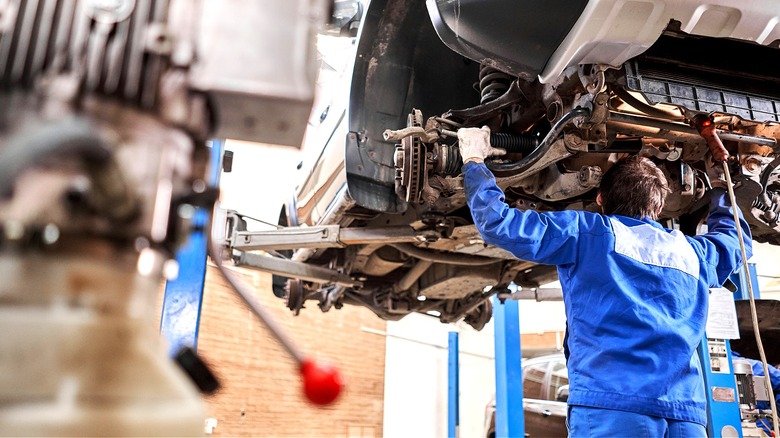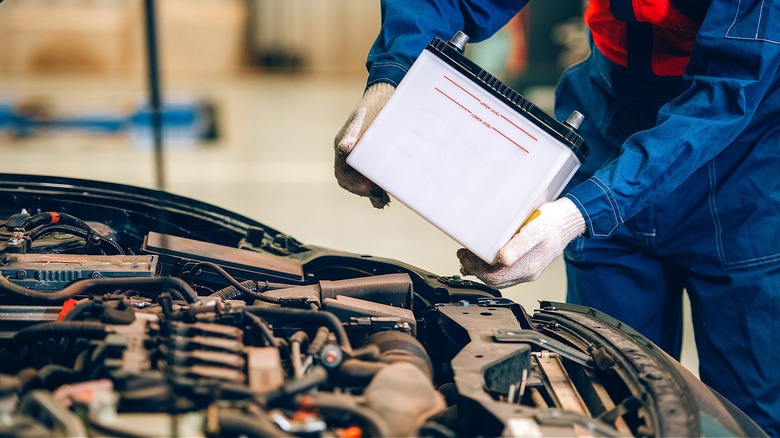At What Point Do Car Repairs Become Not Worth It?
According to Cox Automotive, Kelley Blue Book's parent company, American consumers spend on average $548.32 on car repairs each year. If you were to spread that over 12 months, it'd equal around $45 to $50 a month. At that number, repairing your car would most likely still be worth it, as it only really becomes not worth it once the car repair costs more than the vehicle's total value. If your car is worth $7,500, for example, then paying $550 to keep it running would be more budget-friendly than going out and buying a newer car.
Kelley Blue Book says the price of a new car in 2024 is dropping, with a new car in March costing $47,218, representing the lowest price for a new car in two years. Used cars, meanwhile, cost about half that, with the average price for a used car in March costing $25,540. This said, buying a "new" car (even if used) means taking on new financing, and according to Bankrate, that means paying a monthly payment of $726 for a new car or $533 for a used one, on average, which comes to $8,712 per year for a new car and $6,396 for a used car. So, paying $550 a year for car repairs (which you can also budget for in advance) is going to be, for most, cheaper and well worth it.
When a car repair isn't worth the cost
An insurance company considers a car "totaled" (i.e., a total loss) if the cost to repair the vehicle is more than the car is worth. The same kind of approach can be taken by consumers when it comes to car repairs. If the cost of the car repair is significant, then it may make more sense to sell the car (or trade it in) for a newer car that will hopefully cost less to maintain and keep running. (Learn about the things people always get wrong about buying a used car.)
Keep in mind that the $548.32 car-repair cost reported by Cox Automotive is an average, meaning some repairs will cost less and some will cost more. For example, to replace a battery, consumers can expect to pay anywhere from $60 to $225. This repair is also super-quick, taking about 15 minutes. Replacing a broken transmission, on the other hand, will take one to two days to complete and can cost more than $3,500 on average, which means some replacements could be as high as $7,000. If your vehicle's value is only $7,500, then this car repair is obviously one that won't be worth it.
The importance of preventative car maintenance
Just as neglecting home maintenance red flags can cost you, so too can putting off routine vehicle maintenance. And there's more to preventative car maintenance than the occasional oil change and refilling tires with air. To maintain your car, you will want to keep up with a series of checks for the short term, long term, and seasons. This means regularly inspecting such things as oil and coolant levels, the engine's air filter, and the car's lights. Seasonal checks include changing your vehicle's windshield wipers and rotating the tires, which should happen every 5,000 to 7,500 miles.
Consult your car's owner's manual for guidance on proper car maintenance and what to look for. If your "check engine" light is on, for example, it could be a minor issue like a loose gas cap or a major (and more costly) issue like a problem with the engine or the car's catalytic converter. In short, you can do your part in helping your car stay in good condition and stop a small issue from becoming a big one.
And while car maintenance does cost money, it's also something you can budget for. Meanwhile, vehicle repairs are also an expense you can anticipate, using the $548.32 ($550) yearly average as a starting point. That means setting aside in a sinking fund around $50 a month. At year's end, any money that's leftover can simply roll over to the next.


